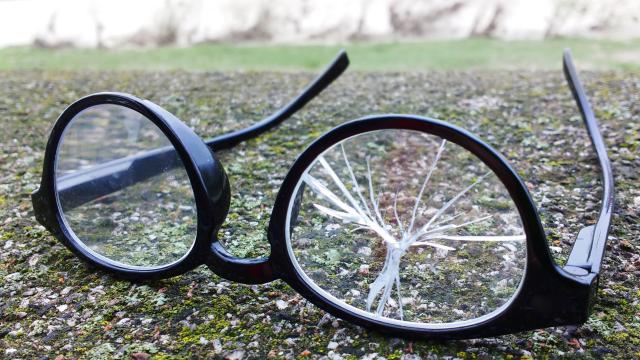You step on your glasses in the middle of the night. Or a house fire melts your eyeglass frames. A tornado rips your glasses right off your face. Or a pandemic worsens, your glasses break, everything shuts down, there’s no way to get a replacement. As a glasses wearer I’ve thought about all these possibilities and more. You may have as well, but haven’t yet taken steps to prepare for a potential eyeglass-less future. Let’s fix that.
Stock up on glasses
Glasses can scratch and break, which is why you should own several pairs. I currently have five pairs at my disposal. And sure, glasses can run on the expensive side, and prescriptions can change — but an old prescription is better than nothing in an emergency, so keep them when you get a new pair. Keep extra pairs in your bag, at your desk, and in the car. And if you have an emergency “go bag,” be sure to keep glasses there as well.
When you’re travelling far from home, bring an extra pair or two for your trip, separating them like they’re the president and vice president leaving the capital. This is especially useful if you’re camping, hiking, boating, or anywhere else far from home base (or an optometrist).
Prevent scratches
If you can, get scratch-resistant lenses, and only clean them with appropriate material like a microfiber cloth. Eye Buy Direct warns against cleaning your glasses with your shirt, as clothing fibres can cause more damage to your lenses than you might think; paper towels and napkins can be even worse.
In an emergency, you can use dish soap and warm water to clean your glasses without scratching the lenses. Use your fingertips and rub non-lotion dish soap on the lenses, then rinse them under warm water.
Another thing you need is an appropriate glasses case, which can range from cheap plastic to expensive leather. You should always have an additional empty case when you travel away from home, as well as an eyeglass repair kit that includes small screws, a screwdriver, cleaning cloth, nose pads, and a magnifying glass. You should own two kits for each pair of glasses you own, and keep them with your emergency pairs of glasses. You’ll never be without glasses or a simple fix when you need it.
Plan for worst-case scenarios
In desperate times, you can use white glue and magazine paper to temporarily bond a broken glasses bridge by stripping the magazine paper into horizontal strips, adding glue, and layering them on both sides. Glue and newspaper can essentially make a papier-mâché bond that can last you for a short time before getting to one of your spare pairs. Similarly, if you lose a glasses screw and need to MacGyver it in an emergency, you can use tweezers to insert a twisty tie into the screw hole.
[referenced id=”534929″ url=”https://www.lifehacker.com.au/2013/09/30-essential-things-you-should-keep-in-your-car/” thumb=”https://www.gizmodo.com.au/wp-content/uploads/sites/4/2013/09/07/18zbro234j859jpg-300×169.jpg” title=”30 Essential Things You Should Keep In Your Car” excerpt=”Some of us keep absolutely nothing in our car boots, while others have enough packed to live in their cars for weeks. Somewhere in between is this list of 30 things we think every car owner should always have on hand.”]
Know how to manage your backup contacts
Contacts are incredibly convenient for daily life, but in a disaster situation they can be a liability, as they require clean water and antibacterial solution. Without clean contact lenses, your eyes are susceptible to infections such as bacterial and fungal keratitis.
If you don’t have contact solution, antibacterial liquid can do the trick, but soap and water is the best alternative. Stocking up on contact solution is obviously the best option, however, whether you’re camping or just stuck inside during a worldwide pandemic. “An eye infection would most likely be your greatest threat when facing the apocalypse in contacts,” says Dr. Kugler, a specialist in LASIK and vision correction surgery.
Unfortunately, contact lenses do expire: A pair of open disposable contacts can last between one day to one month, and hard contacts can last up to a year or more. An unopened pack of contacts can last up to three years. So if you set contacts aside to use in a bind, be sure to keep track of when they expire. And keep a pair of eyeglasses around as well. Maybe several pairs.

Leave a Reply
You must be logged in to post a comment.